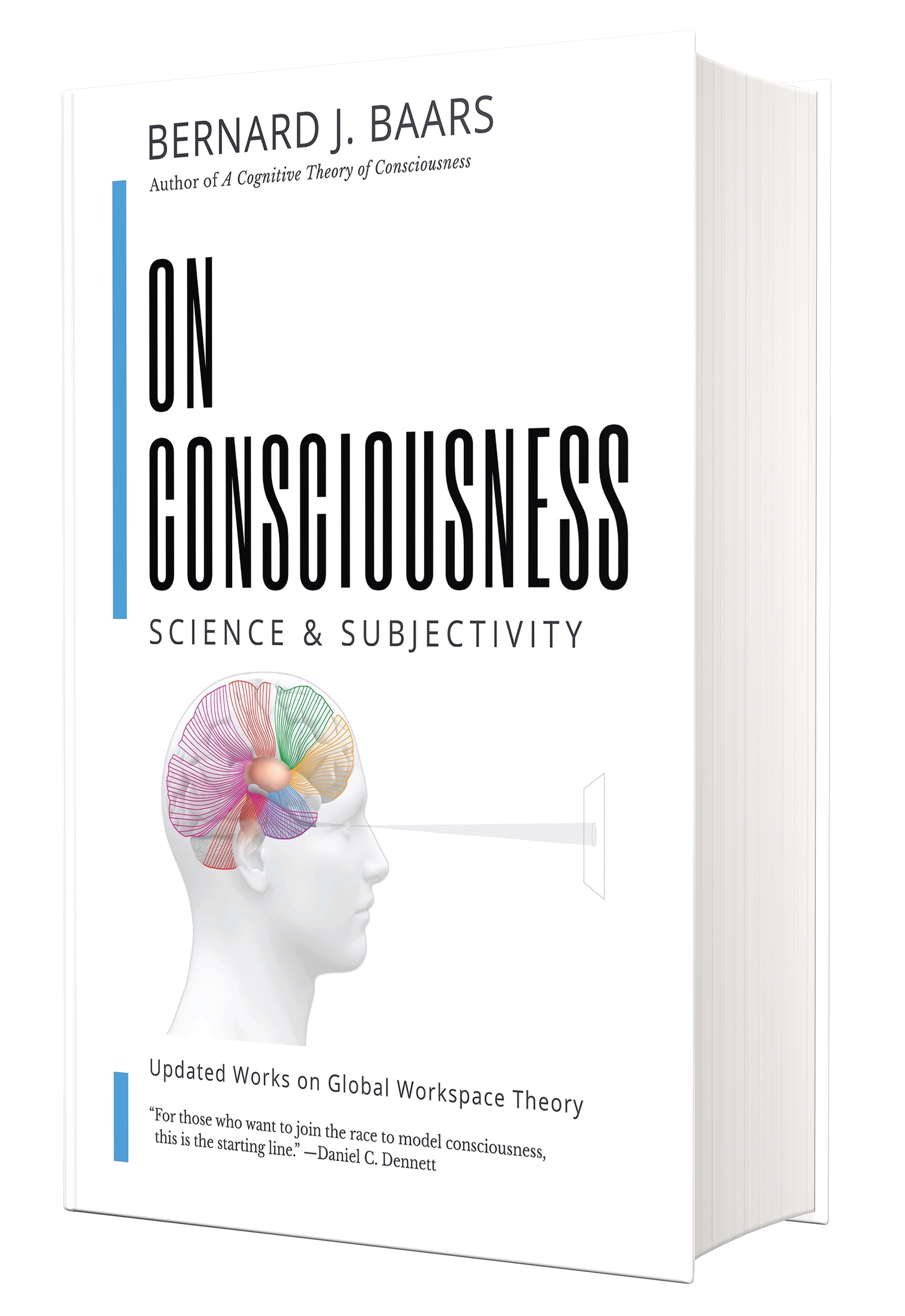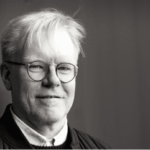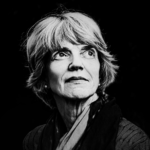On Consciousness
SCIENCE & SUBJECTIVITY
Updated Works on Global Workspace Theory
by BERNARD J. BAARS
“A landmark effort to comprehensively address, in an accessible way, the various dimensions of the global workspace, from its cognitive architecture to the living brain dynamics through which it is manifest.
On Consciousness by Bernard Baars is an indispensable addition to the library of both students and experts who study consciousness.”
— George A. Mashour, M.D., PhD, Director, Center for Consciousness Science; Professor of Anesthesiology, Neurosurgery, Neuroscience, and Psychology, University of Michigan, Ann Arbor
Purchase the book
*VIP Discount Codes will be applied at checkout
What people are saying about “On Consciousness: Science & Subjectivity.”

Bernard Baars is the recipient of the 2019 Hermann von Helmholtz Life Contribution Award by the International Neural Network Society, for work in perception proven to be paradigm changing and long-lasting.
READ AN EXCERPT
Comprised of four parts spanning 1988 – 2013, Bernie Baars’ updated works in ON CONSCIOUSNESS: Science & Subjectivity – Updated Works on Global Workspace Theory form a coherent effort to organize a large and growing body of scientific evidence about conscious brains.
Global Workspace (GW) theory is a widely used framework for our rapidly accumulating body of evidence. It is consistent with our current knowledge, and can be enriched to include other aspects of human experience. GWT has developed inductively, beginning with the best evidence available and emerging as a cognitive architecture.
Part I
Consciousness Explored: Making Sense of the Evidence
Part II
A Scientific Approach to Consciousness
Part III
A Cognitive Theory of Consciousness
Part IV
Global Workspace Dynamics (GWD): Cortical “binding and propagation” in a population of loosely coupled signaling elements
Updated Works on
Global Workspace Theory
I was probing a woman’s brain with an electrode when she said she heard a melody. I was so astonished I re-stimulated the same spot some 30 times. Each time she heard the same melody…
— Wilder Penfield, In Conversation with Denis Brian, Reported In Genius Talk, 1995
CORTEX IS THE ORGAN OF MIND.
The double-decker cortex, both the outer neocortex and the inner paleocortex, were proposed to be the “organ of mind,” as pioneering neurosurgeon Wilder Penfield wrote, based on 1,200 open brain-surgeries in conscious epileptic patients at the Montreal Neurological Institute from the 1920s to the 1950s. Speculation along those lines goes back more than two thousand years to the School of Hippocrates of Cos. But proof positive has been extremely difficult to obtain, and it has taken long-term research programs with advanced brain imaging to settle the question. This image shows the physical stimulation of the fovea, the functional center of the retina, roughly a 1000×1000 array of dense receptors (Part IV, Figure 1b).
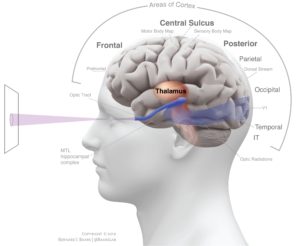
The retinal array is mirrored point-to-point in the visual thalamus (LGN), and again in the first visual projection region called V1. Critically, the connectivity of LGN and V1 is bidirectional, with any minicolumn in LGN linking to a minicolumn in V1, and vice versa. This would seem to risk an explosive feedback loop, but the waking cortex runs very well in the normal, healthy brain.
This puzzling wiring style led Gerald M. Edelman to propose that the cortex operates “near criticality,” so that it is ready for any sensory input or output. Perturbing the delicately oscillating cortex can ignite a rapid broadcast, corresponding reportable visual experiences. Global Workspace Dynamics (GWD) suggests this core idea for visual consciousness.
“This highly readable encyclopedic volume spans some thirty plus years of work by one of the cardinal figures in the modern scientific research on consciousness. It presents an evolving view of the Global Workspace Theory, arguably the most widely accepted scientific theory of consciousness today.
Dr. Baars has been a tireless advocate for the importance of consciousness as a topic of serious scientific research. This volume is a befitting testament to his genius.”
— ZORAN JOSIPOVIC, PhD
Principal Investigator & Cofounder, Nonduality Institute. Research Assoc., NYU Langone Medical Center. Adjunct Asst. Professor for Cognitive & Affective Neuroscience, Dept. of Psychology, New York University.
Product Details
Publisher: The Nautilus Press (Nov 4, 2019); Retail $139 HC, $108 PB, $48.99 eBook
Length: 682 Pages (eBook 938 Pages)
70 full color images, diagrams, illustrations.
ISBN: Hard Cover 9781732904828 | Paperback 9781732904804 | eBook 9781732904897
Categories: Cognitive Science, Psychology, Neuropsychiatry, Neurobiology, Cognitive Neuroscience, Molecular Biology, Biophysics, Language, Mathematics, AI, IT, Computational Neuroscience, Biophysics, Anthropology
Author biography
Bernard J. Baars is an acclaimed author in psychobiology, a preeminent theoretician working in the field today, and one of the founders of the modern science of consciousness. A former Senior Fellow in Theoretical Neurobiology at The Neurosciences Institute in La Jolla, CA, Bernie is author of hundreds of scientific papers, articles, and essays, editor of esteemed journals, founding President of the Association for the Scientific Study of Consciousness (ASSC), and co-founder of the Society for MindBrain Sciences.
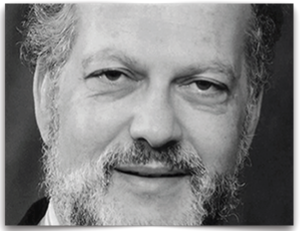
Bernie is best known as the originator of global workspace theory and global workspace dynamics, a theory of human cognitive architecture, the cortex and consciousness.
Author's Website
Author's Podcast
The Podcast On Consciousness with Bernard Baars
Episodes of The Podcast On Consciousness are open-minded discussions on some new ideas about the scientific study of consciousness and the brain.
Many philosophers think there’s a gap between the mind and body, but there’s no evidence for that. Join co-hosts Bernard Baars, originator of Global Workspace Theory (GWT) and acclaimed author in psychobiology, and neuroscientist David Edelman, to discover the conscious brain.
For Educators, Librarians, Booksellers & Distributors
AVAILABLE resources
Email moc.sserPsulituaNehT@niveK for desk copy and Professor/Student bundle discounts, permissions requests, bookseller & library discounts, conference, seminar and special sales.
Online Seminar Details & Registration
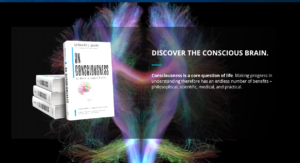
70 full color images, illustrations, and diagrams.
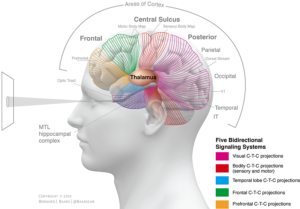
ABOUT THE BOOK
Global Workspace Theory began with one simplifying question:
“How does a serial, integrated and very limited stream of consciousness emerge from a nervous system that is mostly unconscious, distributed, parallel and of enormous capacity?”
A great many therapeutic approaches can be viewed in a global workspace framework,
including traditional psychodynamics and depth psychology, but also cognitive behavioral techniques, and, indeed, many other kinds of carefully studied human functions. Making progress in understanding consciousness therefore has an endless number of ramifications – philosophical, metaphysical, scientific, medical, clinical, and practical. Throughout human history, people have perceived the conscious brain as the great nexus of human life, of social relationships, of their personal identities and histories, in encounters with new challenges.
Consciousness under its many labels and manifestations is widely seen to be one of the core questions of life.
There are numerous approaches to consciousness in the long history of philosophy, biology, the humanities, and the arts. This particular approach emerged through half a century of experimental studies on conscious and unconscious brain events. The emerging science tends to avoid traditional polarities between subjectivity and the brain – the “mindbrain dichotomy” – that is not supported by emerging scientific evidence. If there is a chasm between subjectivity and the brain, it has not been discovered so far.
Bernie Baars’ updated and collected works in ON CONSCIOUSNESS: Science & Subjectivity – Updated Works on Global Workspace Theory form a coherent effort to organize a large and growing body of scientific evidence about conscious brains. Global Workspace Theory (GWT) is a consistent set of ideas about consciousness based on a great deal of psychological evidence, going back over the last two centuries or more. We can now study the living human brain without invasive surgery. Several tides of evidence are joining in ways that make sense.
Global Workspace (GW) theory provides a widely used framework for our rapidly accumulating body of evidence. It is consistent with our current knowledge, and can be enriched to include other aspects of human experience. GWT has developed inductively, beginning with the best evidence available and emerging as a cognitive architecture. GWT provides a set of explicit assumptions that can be tested, as many of them have been in the last twenty years. Global Workspace Dynamics (GWD) is the most current version of GWT – attempting to take into account the complexities of the living brain.
“A valuable reference for technical audiences and a vigorous intellectual hike for the layman.” —Kirkus Reviews
Purchase the book
*VIP Discount Codes will be applied at checkout.
Email moc.sserPsulituaNehT@niveK to receive your VIP Discount Code!
US Retailers
*To use your VIP Discount Code, you must buy directly from The Nautilus Press – simply apply your code at checkout – CLICK HERE to buy On Consciousness now!
To get your VIP Discount Code – email moc.sserPsulituaNehT@niveK today.
US Retailers Include:
*Prices may vary by retailer.
Int'l Retailers
*To use your VIP Discount Code, you must buy directly from The Nautilus Press – simply apply your code at checkout – CLICK HERE to buy On Consciousness now!
To get your VIP Discount Code – email moc.sserPsulituaNehT@niveK today.
International Retailers Include:

